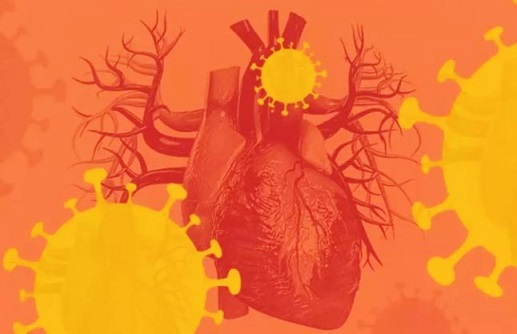Nikhil Prasad Fact checked by:Thailand Medical News Team Jul 15, 2024 1 year, 6 months, 2 weeks, 6 days, 5 hours, 30 minutes ago
COVID-19 News: The COVID-19 pandemic has challenged health systems worldwide, affecting millions. Beyond the immediate respiratory issues, there are concerns about its long-term effects on the heart. This
COVID-19 News report delves into a study that examines the impact of COVID-19 on the levels of certain amino acids in the blood, which could influence cardiovascular health. Researchers from the Medical University of Silesia in Katowice, Poland, aimed to investigate these effects to better understand and address potential long-term health risks.
 COVID-19's impact on Aminothiols and heart health risks
The Study and Its Purpose
COVID-19's impact on Aminothiols and heart health risks
The Study and Its Purpose
The researchers focused on specific aminothiols - cysteine (Cys), homocysteine (HCy), and glutathione - in patients who had recovered from COVID-19. Aminothiols play a crucial role in the body's antioxidant defense and redox balance. Imbalances in these molecules can lead to oxidative stress, potentially accelerating atherosclerosis (the buildup of fats, cholesterol, and other substances in and on the artery walls) and increasing the risk of cardiovascular diseases (CVDs).
Atherosclerosis is a significant risk factor for heart attacks, strokes, and other cardiovascular conditions. Understanding how COVID-19 might exacerbate this condition through biochemical changes could help healthcare providers develop better monitoring and treatment strategies for patients recovering from the virus.
Methodology
The study involved 212 COVID-19 convalescents who participated in a cardiopulmonary rehabilitation program. These patients had a history of symptomatic COVID-19, leading to various complications affecting the respiratory, cardiovascular, nervous, or musculoskeletal systems. The inclusion criteria ensured that the participants were in a post-acute phase of the disease but still experiencing significant health impacts.
Blood samples were taken from the patients and analyzed using high-performance liquid chromatography (HPLC) to measure the levels of Cys, HCy, and glutathione in the blood plasma. The researchers then categorized the data based on several factors: the sex of the patients, the time elapsed since the onset of COVID-19, and the severity of their initial infection. This comprehensive approach allowed for a detailed understanding of how these variables influenced the aminothiol levels.
Key Findings
-Differences Between Men and Women
One of the notable findings of this study was the difference in cysteine levels between men and women. Men were found to have significantly higher levels of cysteine (229.92 µmol/L) compared to women (210.35 µmol/L). This suggests that men might be at a higher risk of oxidative stress and related cardiovascular issues post-COVID-19. Higher oxidative stress in men could potentially explain why they might experience more severe cardiovascular outcomes after recovering from COVID-19.
-Time Since COVID-19 Onset
r />
The levels of cysteine varied significantly depending on how much time had passed since the onset of COVID-19. Patients who were 12-24 weeks post-infection had the highest levels of cysteine, while those more than 24 weeks post-infection had significantly lower levels. Specifically, cysteine levels were 226.82 µmol/L for those <12 weeks, 232.23 µmol/L for those 12-24 weeks, and 208.08 µmol/L for those >24 weeks from disease onset. This fluctuation indicates that the risk of cardiovascular complications might be highest a few months after recovery from COVID-19.
Additionally, the study found that over 11% of patients 12-24 weeks from disease onset had cysteine levels above 300 µmol/L, compared to almost 4% of patients <12 weeks and 2% of patients >24 weeks. This elevated level of cysteine in the intermediate period post-infection could be a critical window for monitoring and intervention.
-COVID-19 Severity
Interestingly, the severity of the initial COVID-19 infection did not significantly impact the levels of the aminothiols measured. This finding suggests that long-term cardiovascular risks might be more influenced by factors such as sex and time since infection, rather than the initial severity of the illness. This insight is crucial as it indicates that even those who had mild or moderate COVID-19 could be at risk of cardiovascular issues later on.
Implications for Cardiovascular Health
The study's results highlight the potential for increased cardiovascular risk in the months following recovery from COVID-19. Elevated cysteine levels, particularly 12-24 weeks post-infection, could contribute to the development of atherosclerosis and other cardiovascular issues.
Importance of Monitoring
Given these findings, it's crucial for healthcare providers to monitor cardiovascular health in COVID-19 survivors, especially in the months following recovery. Regular check-ups and blood tests to measure aminothiol levels could help identify individuals at higher risk and allow for early intervention. Such proactive measures could include lifestyle changes, medications, or other treatments aimed at reducing oxidative stress and supporting cardiovascular health.
Comparison with Pre-COVID-19 Data
Previous research has shown that elevated homocysteine levels are associated with a higher risk of cardiovascular diseases. For instance, a study in Taiwan found that middle-aged and elderly adults with high homocysteine levels had an increased risk of atherosclerotic cardiovascular disease. Similarly, high cysteine levels have been linked to coronary artery disease in some studies. The findings of the current study align with this previous research, reinforcing the importance of these biomarkers in assessing cardiovascular risk.
Conclusion
In summary, this study sheds light on the lingering effects of COVID-19 on cardiovascular health, emphasizing the importance of long-term monitoring and care for survivors. Elevated levels of cysteine and homocysteine post-COVID-19 could pose significant risks, highlighting the need for further research and preventive measures. Understanding these biochemical changes can help healthcare providers develop more effective strategies for managing the long-term health of COVID-19 survivors.
The study findings were published in the peer-reviewed journal: Journal of Clinical Medicine.
https://www.mdpi.com/2077-0383/13/14/4108
For the latest COVID-19 News, keep on logging to Thailand Medical News.
Read Also:
https://www.thailandmedical.news/news/how-covid-19-worsens-heart-disease-via-mir-146a-and-mir-27a
https://www.thailandmedical.news/news/norwegian-study-shows-that-cardiac-troponin-t-can-be-used-as-a-biomaker-in-moderate-to-severe-covid-19-to-determine-potential-heart-issues
